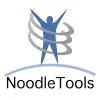Take a look inside 6 images
NoodleTools
Pros: From creating notecards to listing citations, every step is scaffolded with built-in guidance; the focus on doing research right is excellent.
Cons: While it gets all the details right, the site could do more to show students the joy of research.
Bottom Line: While the complex, old-school design isn't ideal, NoodleTools gives students specific assistance where they need it the most -- with citations, paraphrasing, elaboration, and organization.
Ideally, students would start small -- perhaps using NoodleTools to create citations or notecards for short research projects or essays. In subsequent assignments, teachers can gradually introduce students to additional features as the students' research and writing skills improve. Along the way, students can focus on learning direct and indirect quotes, paraphrasing, elaboration, organization, and outlining, alongside lessons about avoiding plagiarism. Eventually, teachers can guide students through the integrated databases, including GALE, Credo, Rosen, and more, to guide students toward the higher-quality credible sources. To facilitate, make sure to use the myriad formative feedback options in the tool; teachers can see progress and ask guiding questions, correct misinformation, or ask students to dig deeper into the research in order to produce better writing and analysis.
Since NoodleTools is so elaborate, it's key to let students master one type of task before moving on to the next; otherwise, they're likely to get frustrated by a tool that, if learned patiently, has potential to be extremely useful throughout the entire research and writing process.
NoodleTools is a web-based research, citation, and note-taking platform. Once students sign in (single sign-on options include Google, Clever, and Office 365) and create a project (or participate in shared projects), they can move from tab to tab (Projects, Dashboard, Sources, Notecards, and Paper), each step of the way building on and informing the next. From source selection and annotation to elaboration and analysis, students get guidance on every part of the research process leading to their final annotated bibliography or paper. To scaffold the experiences, students can also choose their citation format (MLA, APA, or Chicago) and level (Beginner, Junior, or Advanced). This latter option usefully tailors activities and help to students' needs with research and citation. There's even a feature that judges the quality and variety of students' sources to ensure final projects meet assignment requirements. With NoodleTools -- instead of collecting papers and notecards and scheduling conferences -- teachers monitor and comment on students' progress as they work on the assignment, all in the tool. Whether novice or advanced researchers, students can visit the Help Desk at any time for assistance using the tool or conducting research in general.
NoodleTools is free for 30 days, and then it's $15 for an individual account -- which lacks the classroom and collaboration features that kinda make this a special tool. School and district pricing is available for the full-featured version, but you have to contact the developer for pricing. There are some free options available, however. NoodleTools Express and NoodleTools MLA Lite are ad-free options for basic citation, and the Show Me models teach information literacy skills through a series of annotated slideshows. NoodleTools also offers companion apps for iOS and Android.
NoodleTools' all-in-one, scaffolded, feedback-rich approach to the research process has obvious potential for learning. Both teachers' and students' needs have been deftly anticipated and met. There are fantastic, built-in ways of prompting students to consider the value of the source they've selected as well as questions to guide learners toward sound analysis and clarity of thought. But what distinguishes NoodleTools the most is its focus on the "why" of research, valuing the process over just the results.
That said, NoodleTools scaffolds the research process in such a detailed way that some simplification, especially through design choices, could help. At times, the site can feel overwhelming for both teachers and students, and full appreciation of its offerings may take a significant amount of time and patience. The design also lags behind competitors' -- not to mention the everyday tools students would be familiar with (e.g., social media or email) -- and, as a result, feels less inviting and modern. Of course, the nature of research is an orderly and detailed step-by-step process; nevertheless, NoodleTools might do well to help students stick with it more -- whether that's through design, better highlighting of the joy of research and discovery, or both.















